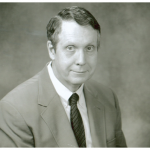Editor’s note: We just learned that Dr. Hal Paulus passed away on April 5, 2019. We are reposting this story today in his memory and will share additional information as we learn it.

Dr. Paulus
From his seminal work demonstrating the role of lymphocytes in rheumatoid arthritis (RA) to the development of a composite index for individual improvement in RA to his work with the Food and Drug Administration (FDA) Arthritis Advisory Committee developing guidelines to test new drugs, the contributions of Harold E. (“Hal”) Paulus, MD, have both paralleled and shaped the maturation of modern rheumatology.
Now professor of medicine, emeritus, in the division of rheumatology, department of medicine at the David Geffen School of Medicine at UCLA in Los Angeles, Dr. Paulus continues to work and expand his powerful legacy in multiple domains. He collaborates nationally and internationally with a variety of metrics and outcomes initiatives, serves on the institutional review board for his institution, oversees the annual Carl M. Pearson Memorial Symposium (which he established in honor of one of his mentors), and continues to guide the division’s junior faculty in their research efforts.
Use All Your Skills
When Dr. Paulus became a physician in the mid-1950s, clinicians had no effective treatments for their patients with rheumatic disease. And yet, the challenge of treating these patients was appealing to Dr. Paulus, because, as he says, “You really have to use all your skills as an internal medicine physician.”
After 10 years in private practice as a family medicine physician in Minnesota, Dr. Paulus recognized that a generalist would no longer to be able to provide optimal care to many patients. He began investigating rheumatology programs and chose UCLA.
Dr. Paulus completed an internal medicine residency under Leo Fred, MD, at the Wadsworth VA Medical Center, and then—encouraged by Carl Pearson, MD, the founding chief of rheumatology at UCLA—applied for the rheumatology fellowship program with John Calabro, MD, at the Wadsworth VA Medical Center (see timeline below). “Dr. Pearson suggested that I train with Ronald Okun, MD, a clinical pharmacologist at Cedars Sinai Medical Center, in order to fill the role of ‘clinical pharmacologist’ for his large NIH [National Institutes of Health] program project grant to study the pharmacology and clinical pharmacology of drugs for chronic rheumatologic diseases,” recalls Dr. Paulus.
Career Timeline
1955 – Earns his MD from the University of Pennsylvania Medical School in Philadelphia

